How To Keep Chest Freezer or Fridge Running During Power Outage
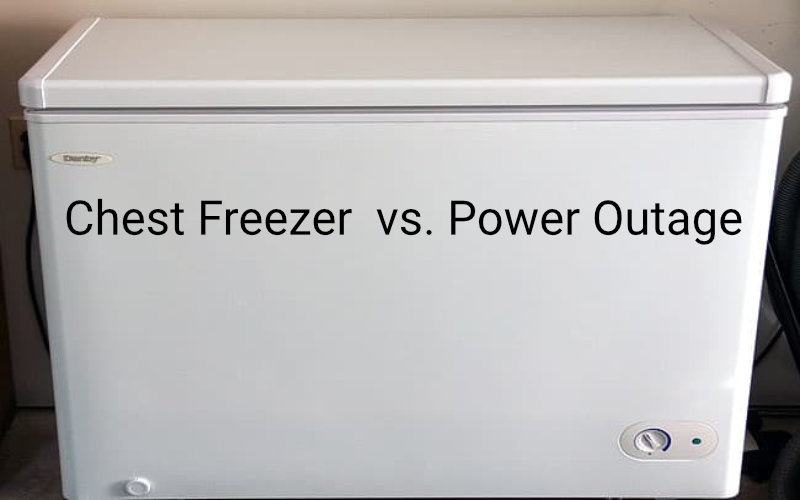
Your deep chest freezer, or even your fridge /refrigerator freezer may have LOTS of $$ money worth of valuable food inside. The LAST thing you want is for it to spoil during a long lasting power outage! So, lets talk about two things… How long to run a generator for a freezer (or refrigerator) during a power outage, and, what size generator to use.
Here are a few pointers how to best deal with this situation. And a few recommended items to have on hand which will greatly help in the process.
UPDATE: I’ve added a comment from a reader here on the blog who kept his freezer and refrigerator running for two weeks during a long term power outage. It’s “real world” experience. Read below to find out how long he ran his generator.
Much of this is common sense. But it’s important.
A freezer or refrigerator will stay colder, longer, if it’s relatively full during a power outage. The fuller it is, the more cold “mass” inside. The more mass, the longer it will stay cold. It’s simply an important concept to understand. If you know your chest freezer is full, it’s definitely going to stay frozen for a lot longer than if it were only partially filled.
In my estimation, most chest freezers that are fairly full will likely stay frozen for ~ 24-48 hours. Keep reading for how to deal with this…
A freezer that’s part of a refrigerator won’t stay frozen as long compared with a chest freezer. They’re smaller. Usually less insulated too. However, you can keep it all running during a power outage…
Size of Generator To Run A Chest Freezer or Refrigerator
You do not need to run a generator full time to keep your freezer or fridge cold during a power outage! Save fuel. Here’s what to know and what to do…
There’s no need for a “Super Max Turbocharged Fuel Injected 500-Horsepower Big Block” generator to get the job done! (/sarcasm)
The power consumption of a chest freezer or refrigerator is not a lot (read caveat below). Here’s how it works:
Freezers work like refrigerators, by compressing air or fluid into a small space and then letting that air or fluid expand into another space.
(the science behind it)
Compressing the fluid makes it give off heat, which happens in the back of the freezer. Letting it expand causes it to draw in heat, which happens inside the refrigerated box.
They run in cycles, triggered by a thermostat inside the freezer. Power cycles on and off.
The energy used while it’s running a compressor cycle may be in the vicinity of ~150 watts. I recommend that you do what I have done, and easily measure it yourself. Here’s an article on how to do it:
[ Read: How To Measure Power Consumption of Appliances ]
Freezer – Refrigerator – Starting Watts versus Running Watts
Caveat: When the compressor first turns on, there is a higher power consumption (inrush surge current, or, “starting watts”). It begins high for a fraction of a second and reduces to “running watts” after a very short time (seconds or less). This inrush current may be ~5x (or more) of normal running power.
So, for generator loading, this might equate to approximately 600 to 1,200 watts, depending.
One of my portable generators is a small 2,000 watt, and it WILL run a chest freezer, even with the startup watts, no problem.
I would say a 2,000 watt or higher will be just fine.
And I strongly suspect that a 1,000 watt would be fine too.
I’ve written about a very interesting Lithium-ion generator which may be perfect for temporary operation of a deep freezer during a power outage:
[ Read: Jackery versus Gas Powered Generator ]
How Long To Run Generator For Chest Freezer or Refrigerator During Power Outage
First, you don’t need to run it all the time. That’s a waste of fuel.
There’s not a clear answer. It will depend on how much cold mass (food) is inside, how well it’s designed and insulated, the ambient temperature of the environment, and the temperature inside the fridge or freezer (see below).
I can tell you what I recommend, and what I do…
Worst, case, as the internal temperature begins to approach 32 degrees F (see below for how to know!), it’s time to run the generator. But I wouldn’t wait that long.
Most chest freezers are recommended to operate and freeze foods to zero degrees F or below. I generally set mine to cycle somewhere between 0 and -10 F. When it’s that cold, foods will stay frozen even longer. Plus it’s better for longer shelf life. However, during a power outage it’s okay if it comes up higher (as long as it stays below 32F).
Remember, less energy is required to maintain an already cold/frozen freezer temperature than it does to bring it down from a warmer temperature.
If it were me, I wouldn’t even wait until it creeps up towards 32 degrees. Rather, I would begin operating my portable generator to provide power to my chest freezers after ~ half a day has gone by. I would run it for about an hour, several times during a 24hr period. Run it more (or less) based on the internal temperature (see below).
Simply monitor the internal freezer temperature change and just keep up with it. Your times will vary.
A while back someone asked about running fridge and freezer with a generator… My power outages from storms in Tennessee (which a couple lasted over two weeks) helped establish required generator run times for both appliances.
I soon realized that keeping both the fridge and freezer full helped on maintaining correct temperaturs for both, with food or bottled water and liquids.
My minimum run times that maintained temps was 30 minutes every 15 hours depending on how well your appliances are insulated.
Use a dedicated thermometer inside both to verify safe temps which takes the guesswork out of the equation.
Some preppers over the years make the mistake of running a generator continuously during a outage…..don’t make that error. I also use a dedicated backup or just the fridge and freezer.
~ Realist
Here’s what I use to monitor my refrigerator / freezer temperature. It would be perfect during a long term power outage too… There’s a temperature display unit that magnetically sticks to the fridge. And two temperature sensors that can clip somewhere inside (and there’s a suction cup).
AcuRite Wireless Fridge – Freezer Thermometer
(view on amzn)
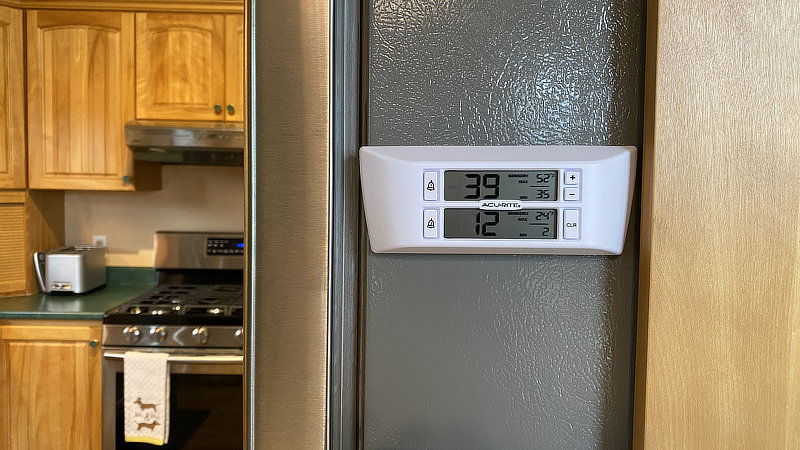
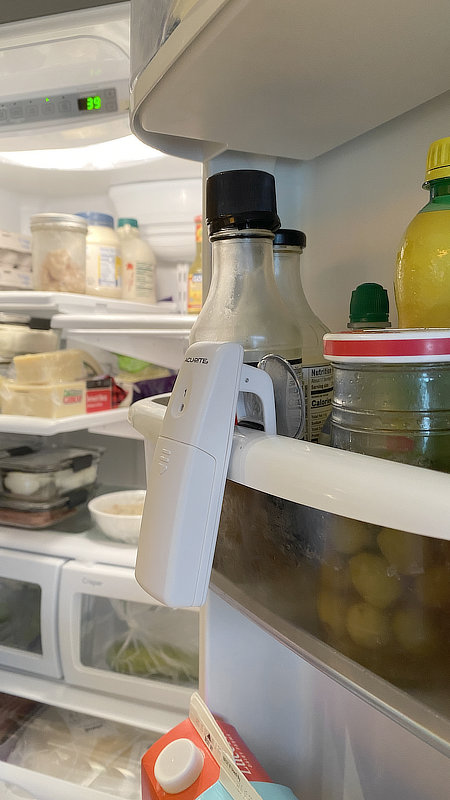
Safety Considerations with Generator
When using a portable generator, always operate it outdoors (not in your garage!). Use high quality and proper gauge extension cord to bring power into the home (e.g. through a window).
[ Read: Best Extension Cord for your Generator ]
Monitor Deep Freezer Temperature With Wireless Thermometer
Keep a wireless, or wired, thermometer inside your chest freezers so that you can read the temperature without opening it up during a power outage!
Wireless Freezer Thermometer is extremely helpful
And I use this method all the time to keep an eye on my deep chest freezers!
I have one in each of my chest freezers. There’s also a temperature readout panel mounted on the wall right above the freezers. I always know what the temperature is inside. The internal temperature is also transmitted wirelessly to a readout panel which I keep on the window sill above the kitchen sink.
As you can see in the image below, I am monitoring three freezers. The display also shows room temperature.
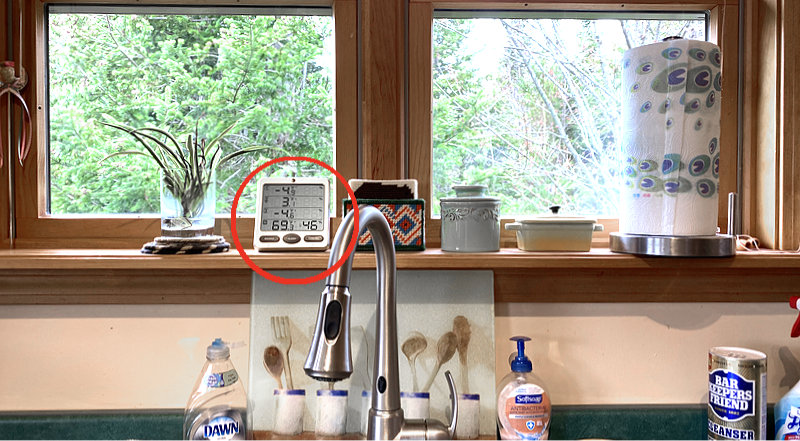
This next photo shows the temperature probe inside the chest freezer. I simply use a piece of tape to hold the wire as shown. Here’s what I really like about this type of freezer thermometer sensor… The transmitter is outside the freezer. So it works better (longer range because signal is less hindered by the freezer’s shell). And the battery isn’t in the freezing cold.
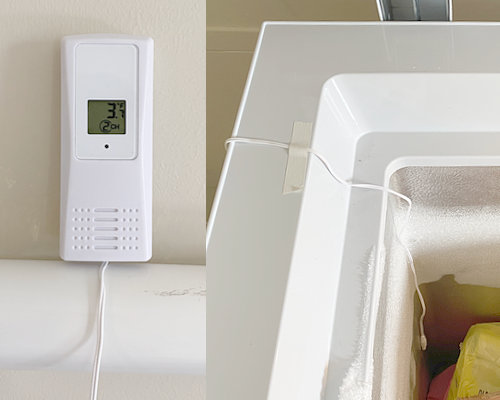
>> Ambient Weather WS-10 Wireless
(view on amzn)
The unit linked above is what I purchased. It comes with three wireless sensors. The kind that will go inside (rather than outside). This may work fine for you. Use lithium batteries (much better performance in the cold).
[ Read: 2 Reasons Why Lithium AA Batteries Are Better Than Alkaline ]
However if you want the sensors with the probe, you can get those separately (they work fine with the base unit above).
>> Ambient Weather F007TP Sensor
(view on amzn)
[ Read: How To Know Your Freezer Thawed While You Were Away ]
